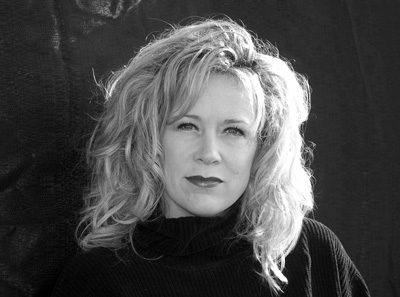
(RNS11-APRIL18) Leslie Montgomery is the author of “The Faith of Condoleezza Rice.” For use
with RNS-10-MINUTES, transmitted April 18, 2007. Religion News Service photo courtesy of
Crossway Books & Bibles.
NEW YORK — Television icon Norman Lear (“All in the Family,” “The Jeffersons”) co-founded People for the American Way in 1981 to counter the growing political power of the religious right. Now he has a new project: Born Again American, an initiative that uses evangelical language to promote civic engagement.
The project is promoted by a country music song written by Keith Carradine and performed by 16 amateur musicians, including clergy, veterans and immigrants. An offshoot of Lear’s Declare Yourself campaign, a nonpartisan effort to encourage young people to vote, the song aims to get more Americans involved in community and national service.
Launched in January, more than 3 million people have viewed the 6-minute music video so far, and more than 120,000 have signed the pledge to make their voices heard, “not just at election time.”
Lear, 86, recently spoke about the project. Some answers have been edited for length and clarity.
Q: How did you come up with this concept?
A: I was making a speech last year, and I was talking about having had a kind of “born-again American” experience: Years ago, (televangelist) Jimmy Swaggart was asking his audience to pray for the “removal” of a Supreme Court justice, like praying for the illness or death of someone. I was just revolted.
So, as I was getting ready to make this speech, I began thinking about other born-again American experiences in my life where I thought, “Am I paying enough attention to the Bill of Rights, to the Constitution, to all these guarantees of freedom and equality under the law?” On New Year’s Eve, I bumped into Keith Carradine playing his guitar, and I told him that I thought there was a song in this phrase. And three weeks later he called me and said, “Hey, you want to hear the song?”
Q: Given your political objections to the religious right, why use evangelical language to promote a message of civic engagement?
A: Religion doesn’t belong in politics, according to my Constitution and yours, but these are our words, too. “Born again,” and the flag, and the God talk, it’s all ours. It doesn’t just belong to the stained glass rhetoric of the pros. We’re all in this together.
Q: In addition to the use of “born again,” some people have objected to the line in the song celebrating “my Bible and my Bill of Rights.” How do you respond?
A: There are two versions of that line in the song. Keith Carradine is on the Web site singing it as the way he wrote it: “My Bible is the Bill of Rights.” I talked to several evangelical ministers who asked me about it and I saw they were troubled by it and I changed it. So, we put both versions on the Web site, and the responses have mainly been very favorable.
Q: As an unaffiliated Jew, and someone who is often described as liberal, is your Bible the Bill of Rights?
A: If you use Bible with a small b, one of my bibles is the Bill of Rights. But, I prefer that you know me by my deeds. You can call me liberal, but I think of myself as a bleeding-heart conservative. I am Jewish, but the dogma of religion doesn’t square with me.
Personally, I love the metaphor of a 1,500-mile river. The climate changes along 1,500 miles and as a consequence, the vegetation changes, the trees are different. But, it’s the same water that nurtures it all. So, I like to think of the vegetation along that lengthy river as all the nuances of religion and the changes of ideas and beliefs, but all nurtured by the same river, which I think of as reverence for each other, for nature, for the abstract. And, there’s room along the river for the atheists, too.
Q: What would Archie Bunker think of “Born Again American?”
A: He and Mike would probably have the same argument they used to have, that’s still going on everywhere right now. But, whatever starts a conversation can’t be bad, because there’s a conversation.
Q: What do you hope comes out of this project?
A: Citizenship is a 24/7 activity. This is a campaign to get people to appreciate the gift that comes with citizenship: the opportunity to feel that you matter, and to indeed know you mattered if you voted, or wrote to a congressman, or let people know what you’re thinking at any moment. It’s only in America.




